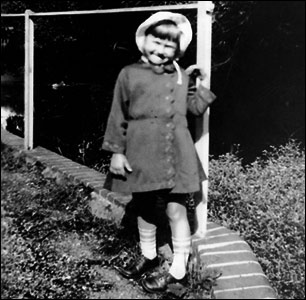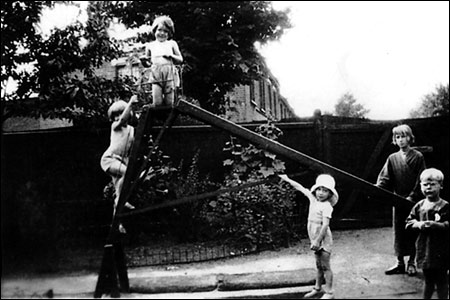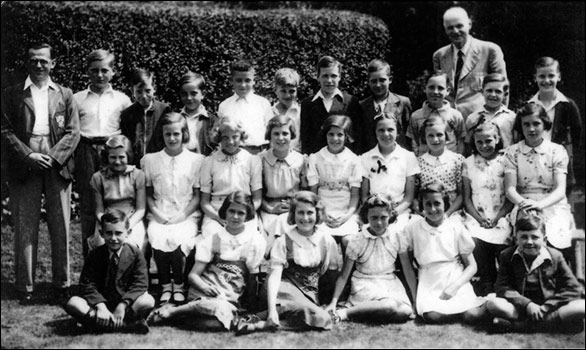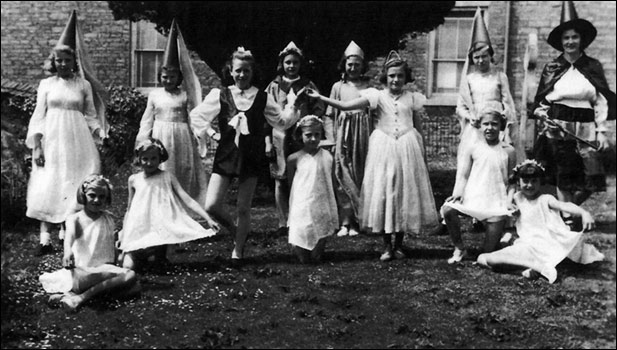|
|||||||
| Article written by Daisy Clarke, presented by Karon Rice |
|||||||
|
Daisy Clarke - Evacuee
|
|||||||
|
|
|||||||
|
|||||||
|
This has come about by me meeting Dorothy Morris, and she reminded me of my mother and brother when we lived at St Mary’s Rectory with the Reverend and Mrs Green. First an insight of my mother and father: mother followed her two sisters into service for Mr and Mrs Thomas Wise, a historian to the When my mother and father married they lived at
When mother was expecting me, Mr and Mrs Wise paid for her to go to a nursing home in Hampstead where I was born and named Daisy Browning. I was nine years old when my family gathered round the wireless to hear Neville Chamberlain tell us that we were at war with
I lived at
We met at
The Women’s Voluntary Service and Spurgeons helped with the children at the time of the evacuation. The kindness shown to us was great, my sandwiches were of egg and the drink was cold tea in a Every week I had to write home on a postcard, the postage was two pence in old money. I wrote that I had some new glasses with steel frames and that Auntie had a birthday party for me and given me a new frock. I also asked if they could send me some money, as I had torn my frock when I fell over, but my sandals were still good. I wrote that the weather was good. The reason the postcards kept so well and we can still read them today is because they were written in pencil. I became part of their lives and by now the bombing of
Father said that my mother and brother were to be evacuated from
This was the second stage of the evacuation; they arrived at The house that we all shared in
I then went to school at Little Street, it was the Baptist Chapel. We only attended in the mornings as the Rushden children attended in the afternoons. We had school dinners which cost 4d old money and walked to a metal building in
The Johnson sisters stayed at the Rectory as well as us; we were all rebels, playing hide and seek all over the rectory house. Two cockney kids in a rural rectory - a rather personal story My brother and I were two frightened kids when we were evacuated from
Yes we were the Brownings, same as the poet, but without the romance. The Reverend Green was a very stern man whose only manual for life was strictly the Bible. I feel quite sure that his motivation for bearing with evacuees was more from his instruction manual than a love of his fellow human beings, but perhaps I misjudged him. It was a privileged to live in such a large house that had fruit trees, supplies in abundance, also pears which we stored and they lasted all through the winter. Nuts for Christmas were hazel and walnut, some of these mother pickled, but we did not care for them. I do believe we were healthier with very good teeth. At home in
We did keep a few chickens and bantams; eggs were preserved in a bucket of Isinglass, which sealed the shells for months. Food was rationed – per person we were allowed:
Bread was not rationed until the war was over, vegetables were plentiful. We also had dried milk and dried egg, petrol was rationed. People were told to make do and mend, utility clothes were made and clothing coupons were introduced. Comics were 2 pence old money, sherbert fountains were ½ a penny with a liquorice straw. At times, we received an extra ration of sugar to make jam, also some dried fruit to make Christmas Pudding and a cake. Two or three times a year mother queued for oranges and bananas available only to children under sixteen years of age, one pound per ration book. What a marvellous manager our mother was, everyone was careful to use every scrap of food. I also remember doing French Knitting with spare wool and nails, four of them in a cotton reel. Film matinees were 2 pence; furniture had a utility sign stamped on it. In addition, you had to have dockets. We made beads from wall paper; also, we were only allowed four inches of water for a bath. The children of
We were rebels playing hide and seek all over the Rectory House, sliding down the banisters causing havoc, often we were called to the study after tea. Then the Reverend came up with a good idea he gave us a tin each to collect the caterpillars from his cabbages. He then gave us one halfpenny (old money) for each one. Always he paid up so we had pocket money. I met my brother one day holding in his hand a little brown mouse, he said “help me set up a business we can breed mice then sell them to our friends at school”. We looked it all up in a book from the library, a mouse is a small rodent they have a lot of litters also they interbreed. Well the production line was going fine. Then we went to
My brother made a guy, put it in an old pram and put it outside the main gates to the Rectory with a large sign: Penny for a Guy. Shoe workers from the Co-op Shoe Factory were most generous but alas, the Bishop visited the Reverend Green and spied Charlie. The lecture in the study this time was about begging. Then we even decided to make our own fireworks, but the Chemist would not sell us the saltpetre. We even tried to rope mother in but she told the Reverend so our venture into fireworks failed, another trip to the study. Our house in East London, Walthamstow to be exact, was Incendiary bombed; that was a fire bomb, everything smelt like fireworks. Then came the VI rockets that caused colossal damage wherever they fell. Later came the V2 rockets known as the doodle bugs, a Flying bomb, a small pilot less plane with an explosive on board, when it ran out of fuel it would fall to earth causing colossal damage and loss of life. In
For the life of me I can’t recollect any sort of trauma, we accepted that this was the way of life at the time. It did have an emotional power for us some of them connected to the experience of the war - an unforgettable event in the lives of all who lived through it. It seems such a pity not to remember with pleasure and gratitude the details of lives that have been rich in all sorts of good things such as games and jokes, clothes and food, also good friends and events. That apart we have met nothing but kindness, and surely gained from our experiences. Mercifully no one counselled us after the war had ended. We heard sad news of the loss of neighbours and loved ones. My brother and I have such a lot to thank Northamptonshire for as it saved our lives. Many of these memories are very sweet, all mixed up as they are with some of the wonder of being a child, so many lovely memories of our parents. We do not have to stay in the past, just visit it occasionally. |
|||||||
|
|
|||||||
|
|



